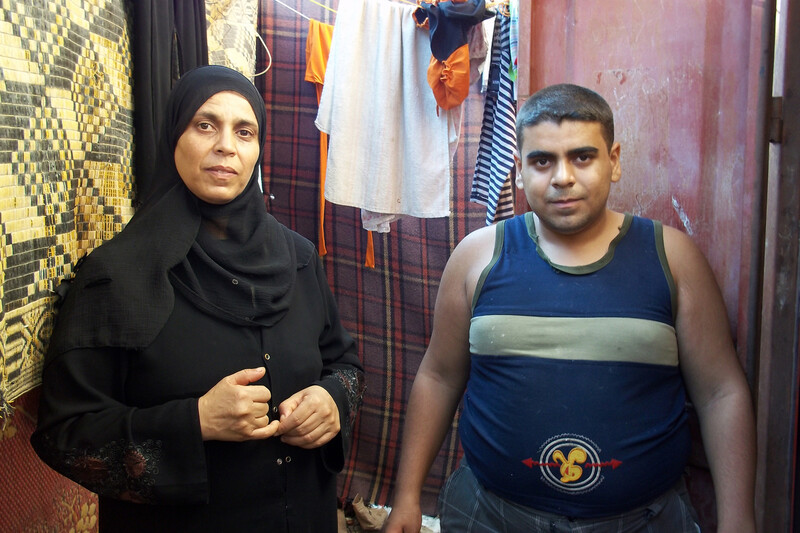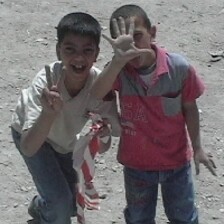The Electronic Intifada Gaza City 5 October 2011

Shahrazad Abu Thuria, with her mentally disabled son Bilal, cannot afford to buy her children school uniforms.
IRINGAZA CITY (IRIN) - As reports come in that the US may be preparing to cut a substantial portion of the aid it gives to the Palestinian Authority because of its bid for statehood, people in the occupied West Bank and Gaza are bracing for possible consequences.
Still branded a “terrorist” organization by the Quartet (the European Union, UN, US and Russia), the Hamas-led government in the Gaza Strip is developing programs to assist the poorest families as the threat of sanctions by Israel and the US looms.
“We are seeking alternative aid to Gaza from Arab nations,” said Omar al-Derbi, assistant deputy social affairs minister in Gaza. A new program under the ministry to begin in October pairs Gaza families in need directly with families from Gulf countries. Ten thousand Gaza beneficiaries will receive 1,000 shekels ($267) every three months for the coming year. Beneficiaries, interviewed by more than 200 social workers in Gaza, include widows and the unemployed.
Shahrazad Abu Thuria, aged 41, from Gaza City, and her six children live in a two-room garage without insulation. Her husband left her 16 years ago, and she is now unemployed. As a refugee, Thuria receives food assistance from the UN agency for Palestine refugees (UNRWA) every three months, but it is not enough to feed her family, she says.
She applied to the Gaza social affairs ministry for assistance a year ago, and says a social worker visits periodically, but her case is still under review.
“My 15-year-old daughter Nida had to stop attending school, since I can’t afford uniforms,” she said. “It will for sure get worse. The siege will tighten and donor funds will decrease.”
The US has been giving about $200 million annually for PA budget support and roughly $350 million to support humanitarian and development projects — mainly channelled through the US State Department, the US Agency for International Development and independent organizations — and not through the PA, said Ghassan Khatib, spokesperson for the PA in Ramallah.
One in four Palestinians lives below the poverty line (defined as $609 per month for a household of two adults and three children), according to the Palestinian Central Bureau of Statistics (PCBS), including 18 percent of Palestinians living in the West Bank and 38 percent living in the Gaza Strip. PCBS also found that 14 percent of Palestinians were living in “deep poverty” ($478 per month for a household of two adults and three children), with 8 percent in the West Bank and 23 percent in Gaza.
These are the people most likely to be affected by possible sanctions.
“[Palestinian Authority President Mahmoud] Abbas’ move at the UN may make our situation worse, the siege may tighten,” said Majda Bedawi, a 36-year-old refugee from Beach Camp in Gaza. She has nine children and her husband has been unemployed for five years.
“We are borrowing from relatives to pay for groceries,” she added. Her family applied for social assistance last week.
Aid dependency on the increase
At present, the plight of many of the poorest families is being eased as a result of assistance by the European Union, the World Bank, and the PA.
In terms of direct financial support to the recurrent costs of the PA, the EU disbursed $213 million from January to September 2011, including $174 million for salaries/pensions and $39 million for social support. In 2010, about $345 million was disbursed to the Palestinians by the EU.
Some 87,000 Palestinian families — 47,000 in the West Bank and 40,000 in Gaza — are receiving social assistance in 2011 from a “national cash transfer program” administered by the EU, World Bank and the PA social affairs ministry in the West Bank, says the PA — an increase on previous years.
About 55,000 families receive EU assistance, 5,000 receive assistance from the Bank, and 27,000 from the PA (this latter group has increased in the past year).
The full integration of Gaza beneficiaries under the program is expected by the end of 2011. As of June 2011, payments to beneficiaries in the West Bank have been transferred into individual bank accounts. For Gaza recipients, benefits will continue to be paid over-the-counter until the transition to the national program is effective. This year’s third quarterly payment was made on 3 October.
No consultation for Gaza
Lack of communication between the PA social affairs ministry and its counterpart in Gaza is affecting the ability of impoverished families in Gaza to enter the system — although, there is greater cooperation between the two ministries than in other sectors like health care. The EU and the Bank only deal with the PA on an official level, and limit contact with the Gaza government to coordination on logistics.
According to a Reuters report, the Obama administration is asking Congress to unblock its freeze on budget support assistance, imposed by the lawmakers as punishment for the PA’s bid for UN recognition of statehood.
Meanwhile, Gaza officials have been complaining about the lack of assistance from the PA. “The PA is not transferring sufficient funds as a result of the internal political conflict,” said al-Derbi. “The ministry requested that 18,000 additional families in Gaza receive assistance,” he added.
Gaza was not consulted on the statehood proposal to the UN.
This item comes to you via IRIN, a UN humanitarian news and information service, but may not necessarily reflect the views of the United Nations or its agencies. All IRIN material may be reposted or reprinted free-of-charge; refer to the copyright page for conditions of use. IRIN is a project of the UN Office for the Coordination of Humanitarian Affairs.


